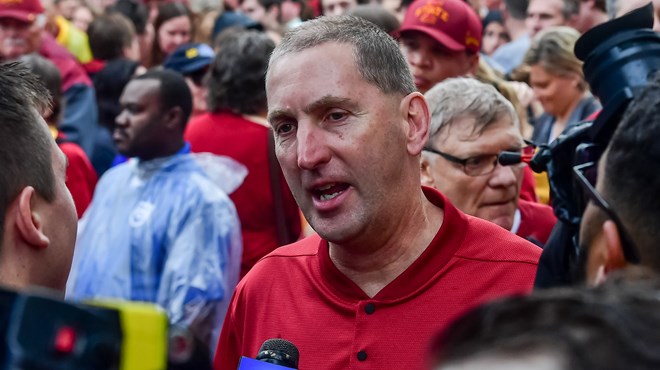Iowa State athletic director Jamie Pollard penned a lengthy letter that was released on Monday morning.
Addressed to the Cyclones’ fan base, Pollard outlined in detail the financial challenges and ups-and-downs that his athletic department is experiencing, and which are echoed by many schools around the country. Pollard also wrote on the question of whether football will be played in the fall and the implications of an affirmative or negative response to that very question.
“Some people have incorrectly framed the issue as safety versus revenue generation. The simple fact is that reality lies somewhere in the middle. As leaders, we remain committed to safety first,” Pollard wrote early in the letter. “As I outlined in my letter on June 25, 2020, we are working hard to develop and implement mitigation strategies to reduce the risk to players and fans at events this fall. More details about these plans will be provided in the near future. We must also be cognizant of the absolute need to generate revenues to sustain our long-term operations. We felt it was important to be transparent about the financial realities in college athletics today to add some context to the discussion. Although I am most-familiar with our financial situation, many peers have shared similar stories in regards to their financial projections.”
Detailing an $86 million budget, $55 million of which is attributable to ‘fixed costs’ within the department, Pollard noted that the school’s athletic department receives no state or university funding, and relies on the primary income streams of television revenue; private donations; and ticket sales. The letter noted that a fall without athletic events would incur approximately $40 million in unfunded expenses within his department; the unviersity reportedly will record a loss of some $73 million from the beginning of the COVID-19 pandemic through late August.
Speaking directly to the question of football vs. no football, Pollard wrote, “This is why we are so committed to trying to find a solution to safely play college sports. We understand there are serious health considerations that are implicated by moving forward with sports. However, we are confident that our department can provide a safer environment for the athletes in Ames, where they are motivated by their teammates and competition to modify their social behavior. We also feel confident that our mitigation efforts can reduce the risk for fans at Jack Trice Stadium. We will be transparent about these efforts so fans can evaluate and choose for themselves whether they are comfortable attending games or not.
“While we cannot eliminate all of the risk associated with athletic competition, under current conditions we believe that moving forward with fall sports can be accomplished. We understand that the COVID-19 pandemic presents a constantly changing decision-making environment and changing health and safety conditions may not allow sports to proceed. This is why it is so important to discuss and develop contingency plans should the pandemic worsen.”
The 16th-year Athletic Director also touched on what ramifications a theorized spring football season could have. “Unfortunately, there are no guarantee things will improve in the spring and there are numerous hurdles to overcome. The most-significant challenge is committing another six months of operational costs (roughly $40M in our case) for the fall semester with no revenues to cover those expenses,” he wrote in the letter.
Pollard’s letter is the most in-depth analysis by an active administrator that has been published regarding the current pandemic-induced financial issues that have affected schools of all sizes. Last week, Florida State announced a 20% cut of their athletic budget; that move included the loss of twenty-five positions within the Seminoles’ department.


